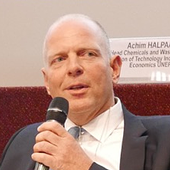Agenda
-
Registration
-
Keynote Keynote address:
 Achim Halpaap
Special Advisor, Chemicals and Health Branch, Economy Division, UN Environment, Switzerland
Achim Halpaap
Special Advisor, Chemicals and Health Branch, Economy Division, UN Environment, Switzerland - Session 1: Safer Chemicals - Global Issues
-
Corporate Sustainability Strategies and chemicals management
• The ECHA study into industry’s sustainability strategies and the impact of regulation, especially REACH and CLP
• Three broad categories of sustainability approaches
• Internal and external change drivers within companies
• Sustainability Strategies: study recommendations -
Proactive Supply Chain Management and Consumer Communication
Normative requirements as a permanent challenge to supply chain actors
• Dynamic material data system as a precondition for compliance and business opportunities
• Consumer awareness and app-supported SVHC requests
• Contribution towards sustainable chemistry management Martin Führ
Professor for Public Law, Comparative Law and Legal Theory, sofia/Darmstadt University for Applied Sciences, Germany
Martin Führ
Professor for Public Law, Comparative Law and Legal Theory, sofia/Darmstadt University for Applied Sciences, Germany -
When the Circular Economy goes Toxic - Restricted Flame Retardants in Toys and Consumer Products Made of Recycled Plastics
• Brief intro to IPEN
• Quick Background
• Toxic Recycling
• The Global South Perspective
• What can be done to resolve this issue? -
Sustainable Chemical Management – what does it really mean and how do we get there?
• The Natural Step’s experience coaching companies up and down value chains
• Use of a strategic framework and set of science-based sustainability principles
• Case study within the European PVC value chain
• A common vision and innovation roadmap to future-proof industry -
Q&A
-
Refreshments
- Session 2: Innovative/Progressive Chemicals Management - how upstream companies are innovating to meet the demands of supply chains
-
Pro-active Product Stewardship @ BASF
• Sustainable Solution Steering (Methodology and Examples)
• Together for Sustainability
• Circular Economy at BASF
• BASF’s contributions to the Sustainable Development Goals -
AkzoNobel - a case study - Using Green Chemistry & Safer Alternatives
• Akzo Nobel’s Priority Substance Program
• New product development -
Q&A
-
Lunch
-
Chemicals management in the supply chain - from compliance to USP, a start up’s perspective
- What is actually driving chemicals management challenges
○ the complex interaction between standards and legislation
○ the reality facing brand owners - Success factors for green collaborations within chemicals management
- A deeper look at the approach of Paxymer - the flame retardant system
○ what it takes to be best in class
○ building a brand within an industrial niche
○ delivering value across the supply chain
- What is actually driving chemicals management challenges
-
Savroc- a case study in alternatives hard coatings
• TripleHard Technology – Trivalent chrome alternative to Hex-Chrome
• From Lab to Industrial implementation
• Case examples and applications -
Q&A
-
Refreshments
- Session 3: Innovative/Progressive Chemicals Management - how downstream companies are innovating to meet the demands of consumers/customers and supply chains
-
Long Term Management of Substance of Concern (SOC) Compliance at Volvo Group
• Monitor Substance of Concern (SOC) Regulation and define/update internal processes and standards
• Compile forecast and define features for long term technology development and planning
• Analyze if substances of concern (SOC) occur in parts/ chemical products & inform customers
• Communicate to suppliers sustainable substitution demands and prepare roadmap for substitution Astrid Breyne
Global Product Regulation - Substance of Concern (SOC) Compliance Management/ Product Planning, Volvo Group
Astrid Breyne
Global Product Regulation - Substance of Concern (SOC) Compliance Management/ Product Planning, Volvo Group -
Sustainable materials – the natural next step to meet consumer expectations
-
What is responsible chemistry in the context of sustainability?
-
Chemical Leasing: An innovative business model in the context of the circular economy
- Introduction to Chemical Leasing
- Chemical Leasing in international chemicals policy and circular economy
- The modules of Chemical Leasing
- Experiences of the implementation in companies
- Examples of applicationsExamples of applications
-
From hazardous waste to using secondary chemical resources - an agenda in Circular Economy
• Chemical substances are used as technical aids in the medical industry
• Possible replacement of these ‘waste products’ as chemicals in the second part of the supply chain -
Q&A
-
Close of Day One / Cocktails











